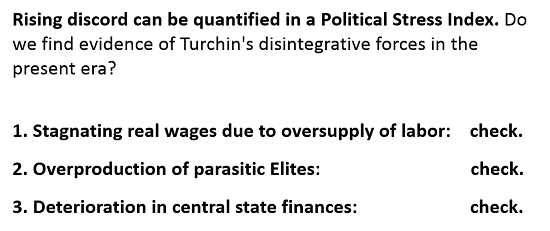In the present era of decadence, Universal Basic Income (UBI) is the modern equivalent of Bread and Circuses.
The dynamics of decadence are easy to understand: as affluence becomes the norm that is widely assumed to be permanent, shared purpose and sacrifice for the common good is replaced by self-absorbed decadence and an ethos of maximizing personal gain.
In his seminal essay The Fate of Empires, Sir John Glubb listed these core dynamics of imperial decline:
(a) A growing love of money as an end in itself.
(b) A lengthy period of wealth and ease, which makes people complacent. They lose their edge; they forget the traits (confidence, energy, hard work) that built their civilization.
(c) Selfishness and self-absorption.
(d) Loss of any sense of duty to the common good.
Glubb included the following in his list of the characteristics of decadence:
-- An increase in frivolity, hedonism, materialism and the worship of unproductive celebrity.
-- A loss of social cohesion.
-- The willingness of an increasing number to live at the expense of a bloated bureaucratic state.
Glubb’s list may at first glance be largely psychological--self-aggrandizement and a focus on hedonistic pursuits--but the dynamics of decadence have economic, political and social ramifications.
First and foremost, the aristocratic financial and political elites secured their position at the expense of social mobility by erecting barriers that protect them from competition and accountability. In effect, they eliminated the risk posed by change by rigging the system to their benefit.
To fund their extravagant lifestyles, they took more of the earnings of those below them, widening the inequality between the aristocracy and commoners to extremes. Historian Peter Turchin reports that where the patricians of the Roman Republic had 10 or 20 times the wealth of an average Roman citizen, by the late Empire the elites possessed up to 200,000 times the wealth of the average commoner.
The heavier burdens on the productive class and the decay of social mobility divested commoners of a financial stake in the system, and the concentration of political power in an oligarchy disenfranchised them of political influence.
When social mobility and shared purpose are lost, there is little motivation to contribute to a system that benefits the few at the expense of the many. People respond by reducing their productive participation and becoming dependents of the state, a phase captured by the phrase Bread and Circuses in the late Roman era, when a significant percentage of the Rome’s populace received free bread and access to costly entertainments in exchange for their political compliance.
Disenfranchised commoners with few prospects for advancement form a volatile political class; a small event can trigger a non-linear explosion that threatens the stability of a status quo that benefits the few at the expense of the many. To counter this threat, the elites bought the compliance and complicity of the masses with Bread and Circuses. As Glubb noted, the willingness to live off the state is a reflection of general decadence; if there is no other hedonistic pursuit within financial reach, then Bread and Circuses will do.
As the eventual collapse of decadent empires attests, Bread and Circuses are no substitute for social mobility, low barriers to accumulating capital and a political stake in the system. In the present era of decadence, Universal Basic Income (UBI) is the modern equivalent of Bread and Circuses. But buying off the disenfranchised doesn’t transform an unstable system into a stable system; it merely masks the instability for a time.
The core belief of decadent eras is that the status quo is so powerful and permanent that it can withstand the predations of the few and the Bread and Circuses lavished on the many.
This is of course a false confidence. Every status quo is a social construct that is inherently non-linear. The decline of productive sectors, the divestiture of commoners from ownership of productive assets and the political disenfranchisement of commoners hollow out the economy and the society.
These dynamics of decadence weaken the social and economic order, creating conditions that favor a loss of faith in the status quo and the failure of key institutions.

My new mystery The Adventures of the Consulting Philosopher: The Disappearance of Drake is a ridiculously affordable $1.29 (Kindle) or $8.95 (print); read the first chapters for free in PDF format.
My new book Money and Work Unchained is now $6.95 for the Kindle ebook and $15 for the print edition.
Read the first section for free in PDF format.
If you found value in this content, please join me in seeking solutions by becoming a $1/month patron of my work via patreon.com.
If you found value in this content, please join me in seeking solutions by becoming a $1/month patron of my work via patreon.com.
NOTE: Contributions/subscriptions are acknowledged in the order received. Your name and email remain confidential and will not be given to any other individual, company or agency.
Thank you, VVV ($5/month), for your splendidly generous pledge to this site -- I am greatly honored by your support and readership.
|
Thank you, Wojciech N. ($10/month), for your outrageously generous pledge to this site -- I am greatly honored by your steadfast support and readership.
|
